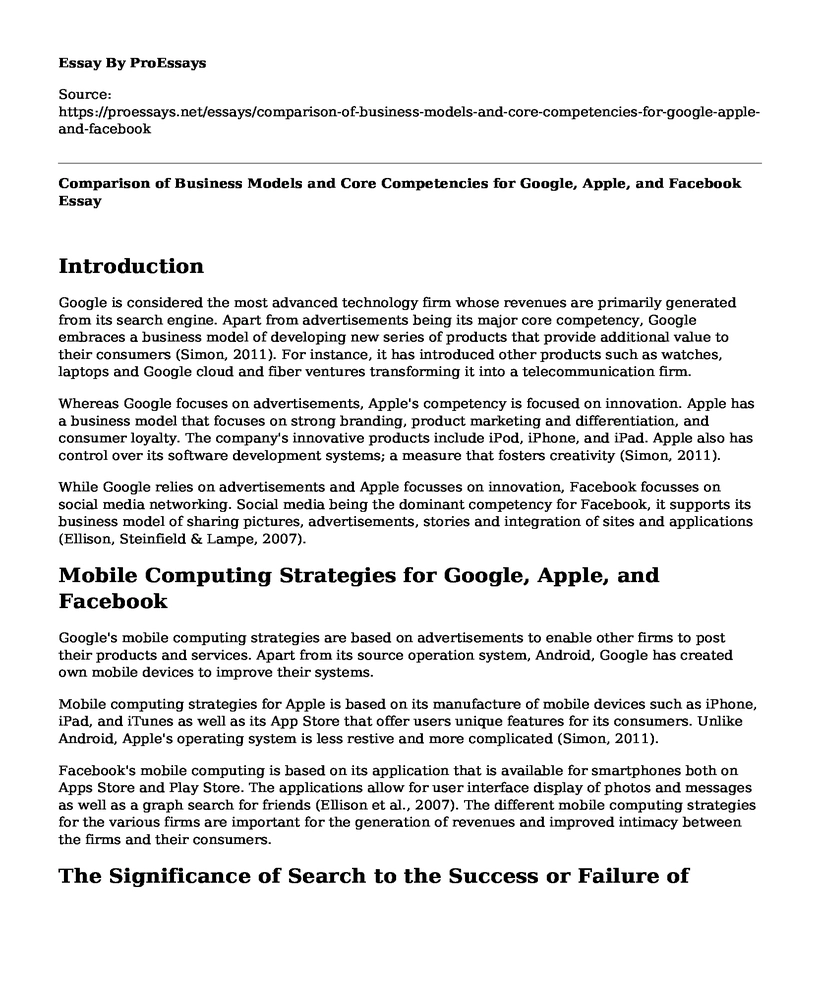Introduction
Google is considered the most advanced technology firm whose revenues are primarily generated from its search engine. Apart from advertisements being its major core competency, Google embraces a business model of developing new series of products that provide additional value to their consumers (Simon, 2011). For instance, it has introduced other products such as watches, laptops and Google cloud and fiber ventures transforming it into a telecommunication firm.
Whereas Google focuses on advertisements, Apple's competency is focused on innovation. Apple has a business model that focuses on strong branding, product marketing and differentiation, and consumer loyalty. The company's innovative products include iPod, iPhone, and iPad. Apple also has control over its software development systems; a measure that fosters creativity (Simon, 2011).
While Google relies on advertisements and Apple focusses on innovation, Facebook focusses on social media networking. Social media being the dominant competency for Facebook, it supports its business model of sharing pictures, advertisements, stories and integration of sites and applications (Ellison, Steinfield & Lampe, 2007).
Mobile Computing Strategies for Google, Apple, and Facebook
Google's mobile computing strategies are based on advertisements to enable other firms to post their products and services. Apart from its source operation system, Android, Google has created own mobile devices to improve their systems.
Mobile computing strategies for Apple is based on its manufacture of mobile devices such as iPhone, iPad, and iTunes as well as its App Store that offer users unique features for its consumers. Unlike Android, Apple's operating system is less restive and more complicated (Simon, 2011).
Facebook's mobile computing is based on its application that is available for smartphones both on Apps Store and Play Store. The applications allow for user interface display of photos and messages as well as a graph search for friends (Ellison et al., 2007). The different mobile computing strategies for the various firms are important for the generation of revenues and improved intimacy between the firms and their consumers.
The Significance of Search to the Success or Failure of Mobile Computing, Competition of Apple and Facebook against Google and whether the Strategies will Succeed
Google provides an efficient means of searching maps, locations and pictures through its PageRank indexing technology. With regards to search technology, Google stands out as the winner (Dinh et al., 2013). Facebook has created partnerships with Bing to show links that friends liked and also sorts information depending on social interactions as well as personal information; an aspect that Google does not master. Although Facebook competes Google intensively, Apple does not have a well-established search engine to compete with Google (Dinh et al., 2013). Instead, Apple has only made attempts to partner with major firms with reputable search engines. Apple and Facebook are thus not likely to surpass Google.
A Company and a Business Model likely to dominate the Internet
Google has become the widely used internet search engine and a majority are attached to its services such as Google maps, Google news, Google Analytics, Gmail or Google Translate and Google search (Simon, 2011). Google's business model for making its services less costly and apps free to everyone translates into tremendous growth and thus its superior position.
Impacts to Businesses or Individuals whenever Google, Facebook or Apple dominate Internet Experience
In case Google dominates the internet experience, businesses and individuals would be forced to use Google services and products. Business and individuals will entirely rely on Google search engine, Google maps, Google news and Google Analytics services.
Whenever Facebook dominates the internet, business and individuals operations are subject to be social network oriented. Facebook's search engine and the ability to integrate websites and share information would force businesses and individuals to use its products and services.
Domination of internet experience by Apple implies that businesses and individuals will rely on Apple's innovative products and services. Individuals will be forced to rely on Apples products and services hence a monopoly.
Domination of internet experience by any of the firms results to forceful use of its services and products hence monopoly; an aspect that affects quality and pricing. Since there will be little competition due to monopoly, prices are likely to go as high as possible and poor product value due to little value considerations.
Reference
Dinh, H. T., Lee, C., Niyato, D., & Wang, P. (2013). A survey of mobile cloud computing: architecture, applications, and approaches. Wireless Communications and Mobile Computing, 13(18), 1587-1611.
Ellison, N. B., Steinfield, C., & Lampe, C. (2007). The benefits of Facebook "friends:" Social capital and college students' use of online social network sites. Journal of Computer-Mediated Communication, 12(4), 1143-1168.
Simon, P. (2011). The age of the platform: How Amazon, Apple, Facebook, and Google have redefined business. BookBaby.
Cite this page
Comparison of Business Models and Core Competencies for Google, Apple, and Facebook. (2022, Jun 13). Retrieved from https://proessays.net/essays/comparison-of-business-models-and-core-competencies-for-google-apple-and-facebook
If you are the original author of this essay and no longer wish to have it published on the ProEssays website, please click below to request its removal:
- World Without Mind by Franklin Foer Essay Example
- Amazon Company Overview
- Essay Sample on Entrepreneurship and Life Satisfaction
- Foreign Direct Investment in Saudi Arabia Paper Example
- Essay on UPS India: Establishing Its Global Network in Fast-Growing Markets
- College Student's Financial Struggle: Eating in Motels & Restaurants - Essay Sample
- Essay Example on Small Businesses: Take it Online for a Broader Market Reach







